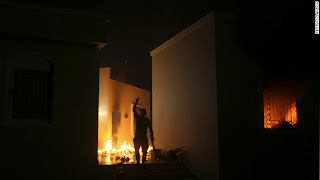The U.S. military did not get involved during the attack on the U.S. mission in Benghazi, Libya, last month because officials did not have enough information about what was going on before the attack was over, Secretary of Defense Leon Panetta said Thursday.
At a Pentagon news briefing, Panetta said there was no "real-time information" to be able to act on, even though the U.S. military was prepared to do so.
"You don't deploy forces into harm's way without knowing what's going on," Panetta said. "(We) felt we could not put forces at risk in that situation."
A defense official provided more context on Panetta's comments about the decision-making involved in not sending U.S. troops to the consulate being attacked in Benghazi.
He said there was a drone aloft but not directly over the area at the time the attack began.
He said the drone was redirected and arrived in time to record some of the attack. But he described what the drone saw as "looking down, seeing a bunch of buildings and fires, a lot of chaos on the ground."
The real Benghazi lessons
He said it was not enough to discern exactly what was happening.
"We didn't have good eyes on the situation. There were security forces there on the ground, but they're in the middle of a firefight - not sending a Sitrep (Situational Report).
The official could not reveal the specific reaction times for the military's Fleet Anti Terrorism Security Teams, which are classified, but said "it would be physically impossible for them to get there in time to intervene in that attack from say, Rota, Spain."
He cited the time it takes just to get their transportation in the air. The official said "these situations normally deteriorate over time ... but usually in a few days, not two hours." He explained that even quick-reaction teams are often positioned for places where intelligence shows a "deteriorating situation" near an embassy.
The official also provided context for Panetta's and Gen. Martin Dempsey's remarks about criticism on the response.
"It's not helpful to provide partial answers," Dempsey said. And Panetta criticized what he called "Monday morning quarterbacking."
The defense official said it was directed at criticism coming from pundits and Capitol Hill.
"In perfect hindsight, yes - we'd do it differently. But how it looks weeks later is not how it looked at the time.
"You had the movie, the 9/11 anniversary and unrest in various countries in that region. All that factored into the decision to put troops on a heightened state of alert. But that doesn't mean forces are positioned everywhere in the world, ready to run to the rescue. We're not the fire department. And there was no actionable intelligence that Benghazi was going to be attacked on 9/11."
Next month, the Democratic-led Senate Intelligence Committee will hold a closed hearing in Washington to review the security situation and intelligence surrounding the Benghazi attack, according to a committee announcement released Thursday.
The hearing, not open to the public, will review intelligence collection and threat reporting in Libya and other Middle East countries before the September 11 attack on the U.S. mission as well as what was known and who is responsible for the attack, among other issues.
A number of government investigations continue into what happened on the attack.

No comments:
Post a Comment